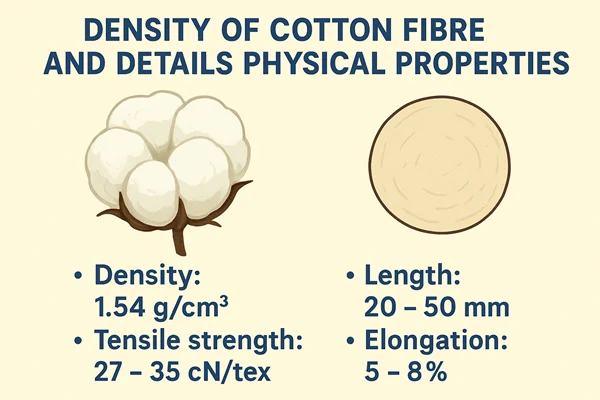Density of Cotton Fibre and Details Physical Properties
Physical Properties of Cotton and Density of Cotton Fibre
Cotton is a natural cellulosic fiber that has been cultivated for thousands of years. It is very famous for its softness, durability, and versatility, making it a popular choice for a wide range of applications in textiles. This article is all about the Physical Properties of Cotton and the Density of Cotton Fibre.

Physical Properties of Cotton Fibre and Density of Cotton Fibre
Cotton fiber has unique physical properties that make it desirable for use in clothing, textiles, and other products. Here basic physical properties of cotton fiber are discussed in brief.
01. Staple Length: Staple length refers to the length of individual fibers in a mass of textile material. It is measured as the distance between the two points where the fiber is free from the surrounding material. The staple length of cotton fibers is typically 1-2 inches long, but can range from less than half an inch to over two inches in length.
02. Diameter: The Diameter of textile fibers affects their strength, fineness, texture, and performance in various textile applications. Cotton fibers are typically 20-30 microns in diameter, making them relatively thin and suitable for spinning in the yarn manufacturing process.
03. Color: Cotton fibers are typically white or off-white, although some varieties of cotton can be brown or green.
04. Tensile Strength: Tensile strength is the maximum stress that a fiber can withstand before breaking. It measures the strength of a fiber when it is subjected to stretching or pulling forces. Cotton fibers are moderately strong, with a tensile strength of around 3.5-5.0 grams per denier.
05. Elasticity: Elasticity is important in textile fibers as it affects the comfort, fit, and shape retention of textile products such as clothing and upholstery. Cotton fibers have limited elasticity, meaning they do not stretch or recover well from stretching. It has a breaking elongation range from 4% to 8% only.
06. Density of Cotton Fibre
The density of cotton Fibre affects the weight, volume, and texture of textile products. It also influences their thermal and acoustic insulation properties, as well as their durability and performance. Cotton fibers have a density of around 1.54-1.56 grams per cubic centimeter.
07. Absorbency: Absorbency is very important in textile fibers as it determines the dyeability of the fabric. Cotton fibers are highly absorbent, capable of holding up to 27 times their weight in water.
08. Moisture regain: Moisture regain reflects the ability of the fabric to absorb moisture, which affects its comfort, durability, and performance in various applications. Cotton fibers have a moisture regain of around 8-10%, meaning they can absorb and release moisture easily.
09. Heat resistance: Cotton fibers have good heat resistance, able to withstand temperatures up to 150-160 degrees Celsius.
10. Flame resistance: These fibers are not inherently flame resistant, but can be treated with chemicals to improve their flame resistance.
11. Chemical resistance: Cotton fibers are generally resistant to most chemicals, but sensitive to acids. It can be damaged by strong acids and alkalis.
12. Luster: Cotton has a natural luster that can range from dull to shiny, depending on the processing method.
13. Texture: Cotton fibers have a soft, smooth texture that is highly desirable for clothing and textiles.
14. Drape: Cotton fabrics have a good drape, meaning they hang well and are comfortable to wear.
15. Wrinkle resistance: Cotton fibers are prone to wrinkling, but can be treated with chemicals to improve their wrinkle resistance.
Conclusion:
Cotton fibers have a range of unique physical properties that make them a popular choice for a wide range of applications. From their strength and elasticity to their absorbency and heat resistance, cotton fibers offer a combination of properties that make them highly desirable for use in clothing, textiles, and other products. Whether you are looking for a soft and comfortable fabric or a durable material that can withstand the elements, cotton is an excellent choice.
